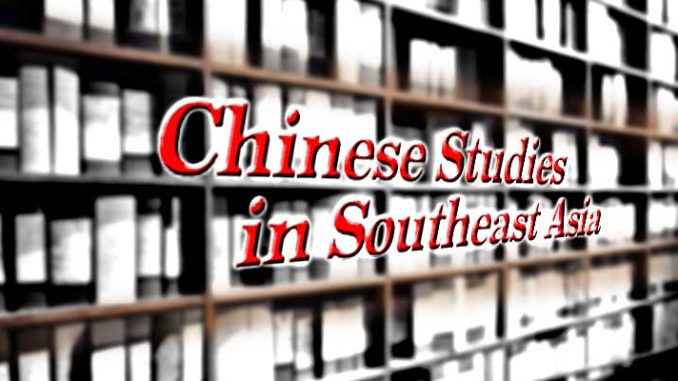
In September 1985, through the joint effort and support of fifteen Chinese Associations, the Malaysian Chinese Resource and Research Centre (华 社 资 料 研 究 中 心) was officially inaugurated in Kuala Lumpur. In July 1993, the Centre was registered and gained approval as a non-profit limited company, Huazi Resource & Research Centre Bhd. In August 1996, it was renamed the Centre for Malaysian Chinese Studies (华 社 研 究 中 心). The Centre promotes academic research on all relevant areas of study pertaining to the Malaysian Chinese, as well as to their relations with other communities both within and outside Malaysia. It attaches importance to promoting ties and co-operation with scholars of Overseas Chinese studies locally and abroad, often through seminars and conferences. Currently, its semi-academic magazine, “Rewen Zhazi” (人文杂志, Magazine of Humanities), is published quarterly. Its bilingual Journal for Malaysian Chinese Studies is published annually.
In Singapore, the Chinese Heritage Centre was established in May 1995 with the aim of advancing knowledge and understanding about communities of people of Chinese descent throughout the world – the carriers of Chinese heritage. The Centre is specifically interested in Chinese communities outside China, rather than people in the mainland as such, but sees them to be linked by common ancestry, traditions, memories, beliefs, customs, manners, and even skills – the so-called “Heritage.” Therefore, its Chinese name is Huayi Guan (华裔馆), which conveys the Centre’s primary function as an historical or cultural museum oriented toward transmission of culture to new generations, rather than as an academic institution.
The two centers bear striking similarities in financial and organization structure. Both depend on financial support from local Chinese businesses and associations. And each has recently appointed a prominent, retired, local university professor as director – Voon Phin Keong , a geographer from the University of Malaya, and Ng Chin-keong, a historian from the National University of Singapore. But differing social and political realities in the two countries have resulted in other, substantial differences between the two centers.
In Malaysia, almost every important issue concerning the Chinese community can be covered, including politics, history, literature, and social-cultural life. This is reflected in the Centre’s keen interest in cultural interactions between Chinese and Malays. For example, current director Voon Phin Keong is planning a research project on ethnic relations in Malaysia – a strong indication of the country’s relatively liberal academic environment. The Centre is visited by Southeast Asian scholars, both local and overseas, who work on Malaysian and Chinese studies. And it has done a great deal of basic, and some pioneering, work without which our knowledge of the local Chinese community and its history would be quite incomplete. Most of their publications are in Chinese. A few examples of the Centre’s recent works, all in Chinese, are:
- 何启良 著. 《政治动员与官僚参与 — 大马华人政治述论》
Ho Khai Leong. 1995. Political Mobilization and Bureaucratic Participation: Essays on Malaysian Chinese Politics. Kuala Lumpur: Huazi Resource & Research Centre Bhd. - 林水檺,何国忠, 何启良, 赖观福 合编. 《马来西亚华人史新编》, 全三册
Lim Chooi Kwa, Hou Kok Chung, Ho Khai Leong, Lai Kuan Fook, eds. 1998. A New History of Malaysian Chinese. 3 volumes. Kuala Lumpur: Federation of Chinese Associations Malaysia. - 林开忠 著. 《建构中的“华人文化”:族群属性、国家与华教运动》
Lim Khay Thiong. 1999. Constructing “Chinese Culture”: Ethnicity, State and the Chinese Education Movement. Kuala Lumpur: Centre for Malaysian Chinese Studies. - 林廷辉 ·宋婉莹 著. 《马来西亚华人新村五十年》
Lim Hin Fui. 2002. Fifty Years of Malaysian Chinese New Villages. Kuala Lumpur: Centre for Malaysian Chinese Studies. 2nd edition. 2002. - 何国忠 著. 《马来西亚华人:身份认同与文化的命运》
Hou Kok Chung. 2002. The Chinese in Malaysia: Identity, Culture and Communal Politics. Kuala Lumpur: Centre for Malaysian Chinese Studies.
In Singapore, where sensitive historical legacies focus on Nanyang University, “heritage” is deliberately defined as the Centre’s priority. Perhaps for similar reasons, the Chinese Heritage Centre recruited as its first two directors expatriate Chinese and non-professional scholars, each with a three-year tenure: Lynn Pan, a mainland Chinese expatriate based in the United Kingdom, and Kee Pookong, a Malaysian Chinese expatriate recruited from Australia. This may also explain why, in contrast to its Malaysian counterpart, the Centre’s website is in English, not Chinese.
The research of the Chinese Heritage Centre depends largely on the collective efforts of scholars, and has not published as much as the Centre for Malaysian Chinese Studies. The Encyclopedia of the Chinese Overseas is its most influential publication. The following is a list of its projects and publications to date:
Lynn Pan, ed. 1998. The Encyclopaedia of the Chinese Oveseas. Singapore: Archipelago Press & Landmark Books.
- 香港:三联书店(香港)有限公司. 1998. Hong Kong: Joint Publishing (HK) Pte Ltd.
Kee Pookong and Choi Kwai Keong, eds. 2000. A Pictorial History of Nantah History [former Nanyang University]. 《 南 洋 大 学 历 史 图 片 集》Singapore: Times Media Private Limited.
- 纪宝坤, 崔贵强, 庄国土 主编. 2002. 《族谱和海外华人研究》. 华裔馆和厦门大学东南亚研究中心 联合出版. CHC & National Key Centre of Southeast Asian Studies, Xiamen University.
Kee Pookong, Choi Kwai Keong, Zhuang Guotu, eds. Genealogies and Chinese Overseas Studies. (Chinese only.)
- 崔贵强. 2002. 《东 南 亚 华 文 日 报 现 状 之 研 究》. 华裔馆和南洋学会联合出版.
Choi Kwai Keong. 2002. A Study of the Current Chinese Dailies in Southeast Asia. Singapore: CHC and South Seas Society. (Chinese only.)
- Chinese Community Organisations and Globalisation. (No publication details available.)
Prof. Ng Chin-keong took office in mid-2002 and has ambitious plans to raise the Centre’s profile and academic standing. Future plans include:
- A journal on overseas Chinese, to be launched in 2004 in conjunction with other institutions;
- A Chinese Heritage Monograph Series, to be launched in 2003;
- A quarterly newsletter, scheduled to begin in March 2003;
- A documentation center for overseas Chinese and Chinese culture.
Wu Xiao An
The author is associate professor in the Department of History, Peking University.
Kyoto Review of Southeast Asia. Issue 3: Nations and Other Stories. March 2003

